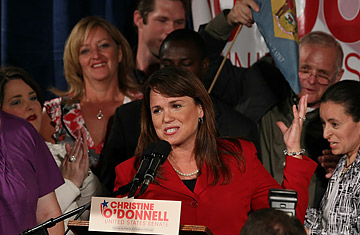
U.S. Senate candidate Christine O'Donnell speaks to her supporters after she won the Delaware U.S. Senate primary against Rep. Mike Castle in Dover.
You can draw a straight line between the weakness of the Republican Party after Barack Obama's smashing 2008 victory and Tuesday night's victory for Christine O'Donnell over Mike Castle in Delaware's Republican Senate primary.
O'Donnell is the poster woman for the Tea Party — an outsider, backed by Sarah Palin and South Carolina's anti-establishment Senator Jim DeMint, and committed to ridding the GOP of accomodationists like Castle, who is now the poster man for the destruction that is occurring within the Republican Party because not one single leader has done anything to limit or question the power of the Tea Party.
Back in January of 2009, the Republican Party was weaker than either major party has been in several generations. The only thing they lacked as much as ideas, leadership, or organization was energy. The newly minted president made the decision to put congressional Republicans on the spot. They were forced to vote with him on big packages like the stimulus bill, thereby incurring the wrath of their remaining supporters, or vote against him, alienating the center of the electorate. Not willing to give Obama any victories and afraid to lose the only followers they had left, Republicans chose to stay on the hard right. Catering to the Tea Party and sticking to this anti-Obama legislative strategy, the opposition party went into full obstructionist mode on almost every issue, and nearly always unanimously.
Since then, the Tea Party has blossomed and grown in influence. The only Republican politicians who have spoken out against the dangers of turning the Party of Lincoln into the Party of Palin and DeMint were those incumbents such as Utah Senator Bob Bennett, who lost their nomination fights to candidates on their right, after being attacked for even considering compromises with Democrats.
There will be a lot of focus, and rightly so, on the fact that O'Donnell's victory makes it highly likely that Democrats will be able to keep the Delaware seat that was held by Joe Biden — which in turn will make it less likely that the Republicans can win the ten seats they need to take control of the Senate. Castle was a lock to win in the general election; a senior Republican strategist told TIME over the weekend that O'Donnell has zero chance of winning in November.
But the bigger issue is the state of the Republican Party. When it was weak, the GOP was unable to resist the siren song of the Tea Party activists who heeded the dog whistles on Fox News and talk radio, crowded into town hall meetings to attack the Democrats' health care efforts, and focused the party laserlike on the debt and deficit concerns that have positioned Republicans for huge gains in the midterms.
The activism and patriotism of the Tea Partiers are admirable, but the GOP has put itself at risk long term. Republican leaders in Congress and the party's potential 2012 presidential candidates didn't show any public concern when Tea Party-backed candidates like Rand Paul in Kentucky beat establishment choices in primaries. Party strategists have claimed the anti-Obama energy is so strong among the right and center (matched by malaise on the left) that in almost every district and state in the country, the Tea Party label and the sometimes off-beat or extreme views of a Republican nominee won't stand in the way of victory this year with anti-Obama sentiment running so high. They are likely to be right in most cases this year.
But O'Donnell is different. She is the canary in the coalmine for a level of intraparty bloodletting that will likely cost the party one Senate seat in November. And if the GOP establishment doesn't figure out how to build a bigger tent and still win elections, the price Republicans will pay will be a whole lot higher starting on November 3, into the new Congress, and when they try to beat Obama in 2012.
